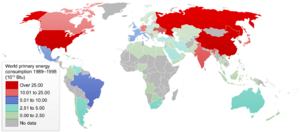Energy (society) facts for kids
Energy is super important for our world and how we live every day! It's what powers everything around us, from the lights in our homes to the cars we ride in and the computers we use for school. Without energy, modern society wouldn't be able to work. We use energy for things like growing food, getting around, managing our waste, and staying connected with friends and family through technology.
Since the Industrial Revolution hundreds of years ago, people have started using a lot more energy. This has helped us build amazing things and make life easier. But it has also created some big problems, like global warming, which is making our planet hotter.
Making and using energy is a huge part of the world's economy. It's really important for every country to use energy wisely and make sure there's enough for everyone.
Contents
What is Energy?
Energy is the ability to do work or cause change. Think about it like this: when you push a swing, you are using energy. When a car moves, it uses energy. When a light bulb glows, it's turning electrical energy into light and heat. Everything that moves, grows, or changes needs energy.
We use energy all the time, even when we don't realize it. Our bodies use energy from the food we eat to move, think, and grow. Plants use energy from the sun to make their own food. Energy comes in many different forms, like heat, light, sound, and electricity.
Why Do We Need Energy?
We need energy for almost everything we do in our daily lives.
- At Home: Energy powers our lights, refrigerators, TVs, computers, and heating or air conditioning systems. It helps us cook food and wash clothes.
- For Travel: Cars, buses, trains, and airplanes all need energy to move. Most of them use fuel like gasoline or diesel, which are forms of stored energy.
- In Schools and Businesses: Energy keeps schools warm or cool, powers computers in classrooms, and runs machines in factories.
- For Communication: Our phones, the internet, and television all rely on a constant supply of energy to work.
- For Food: Energy is used in farming to power tractors and other machines. It's also used to transport food to stores and keep it fresh.
Different Kinds of Energy
Energy sources can be divided into two main groups: non-renewable and renewable.
Non-Renewable Energy
Non-renewable energy sources are those that we can't easily replace once they are used up. They took millions of years to form deep within the Earth.
- Fossil Fuels: These include coal, oil (petroleum), and natural gas. They formed from the remains of ancient plants and animals. When we burn fossil fuels, they release energy, but they also release gases that can harm the environment.
- Nuclear Energy: This comes from splitting tiny atoms, usually uranium, in a process called nuclear fission. It produces a lot of energy without releasing greenhouse gases, but it creates radioactive waste that needs to be stored safely for a very long time.
Renewable Energy
Renewable energy sources are natural resources that can be replaced or replenished over a relatively short period of time. They are much better for the environment because they produce less pollution.
- Solar Energy: This comes from the sun's light and heat. Solar panels can turn sunlight directly into electricity.
- Wind Energy: Wind turbines use the power of the wind to spin blades, which then generate electricity.
- Hydropower: This uses the force of moving water, usually from dams on rivers, to spin turbines and create electricity.
- Geothermal Energy: This comes from the heat inside the Earth. Geothermal power plants use steam or hot water from underground to generate electricity or heat buildings.
- Biomass Energy: This comes from burning organic materials like plants, wood, and animal waste. It's considered renewable because these materials can be grown again.
Energy and the Environment
While energy is essential, how we produce and use it can have a big impact on our planet. Burning fossil fuels releases gases like carbon dioxide into the air. These gases trap heat in the Earth's atmosphere, leading to global warming and climate change. This can cause more extreme weather, rising sea levels, and harm to plants and animals.
Using more renewable energy sources helps reduce pollution and slow down climate change. It's a way to power our world without harming it as much.
Saving Energy
Everyone can help save energy! Saving energy means using less of it, which helps the environment and can save money too.
- Turn off lights when you leave a room.
- Unplug chargers and electronics when you're not using them, as they can still use a little power even when turned off (this is called "phantom load").
- Take shorter showers.
- Walk or bike instead of asking for a car ride when possible.
- Help your family make sure windows and doors are sealed well to keep heat or cool air inside.
- Choose energy-efficient appliances when it's time to get new ones.
The Future of Energy
Scientists and engineers are always working on new ways to produce and use energy more efficiently and cleanly. This includes improving solar panels, making wind turbines more powerful, and exploring new technologies like hydrogen fuel cells. The goal is to create a future where we have enough energy for everyone without harming our planet.
See also
 In Spanish: Industria de la energía para niños
In Spanish: Industria de la energía para niños


